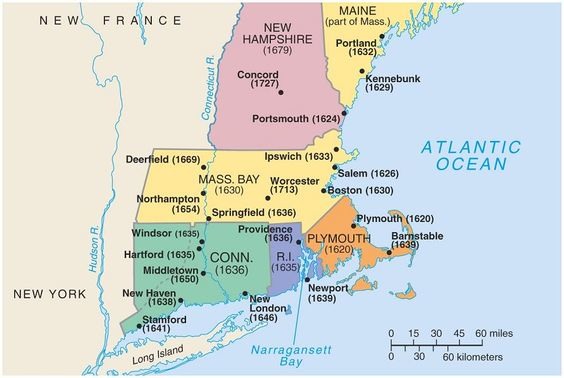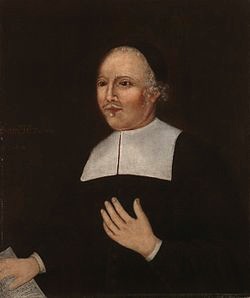NEW ENGLAND ORIGINS

Elihu Yale’s father, David Yale, arrived in America seventeen years after the first settlers sailed in the Mayflower; he was taken there by his stepfather to avoid the persecution of the Puritans in the reign of Charles I. Elihu was born on 5th April 1649 in Boston Massachusetts, the same year that Charles I was executed, which makes him a Welsh American by birth. He was the second son of David Yale and his wife Ursula. His father was a rich merchant banker who lived in a large house in the city of Boston.
The Yales could trace their genealogy back to the lovely Princess Nest, daughter of Rhys ap Tewdwr, Prince of Deheubarth in South Wales in the time of Henry I. In the late fifteenth century a family descended from Nest settled at Plas Yn Ial, Clwyd, and later adopted the surname Yale.
In the late sixteenth century, Elihu's great grandfather, Dr David Yale, who came from Plas Yn Ial, was appointed Vicar General to George Lloyd, the Bishop of Chester. He bought an estate, Einon's Grove, near Wrexham. His son, Thomas Yale, married the Bishop's daughter, Anne. They had four children but Thomas died in 1619 and his young widow married a wealthy merchant, Theophilus Eaton, himself a widower with two children.
The Lloyds and the Eatons had been neighbours in the Yale country in the North of Wales, but Theophilus Eaton had become one of the leading merchants in London, associated with St Stephen's parish which, under its minister, Rev John Davenport, was a centre for the most extreme Puritan wing of the Church of England, belonging to the 'gathered church' tradition which distinguished between mere church attenders and true Christians who had undergone an experience of spiritual regeneration. Anne arrived in London with her children, including her sixteen year old son David, in 1630, and they lived in the house of Sir Richard Saltonstall who had left for America. Some seventy years later, Saltonstall's great grandson, Gurdon, was governor of Connecticut when the college at New Haven was named after Elihu Yale.

Reverend John Davenport, (1597-1669/70)", oil on canvas, by the 'Davenport limner' (unknown artist)
Theophilus Eaton and his family, including his own children by his first marriage and Anne's children by her first marriage, left London to go to North America in 1637, on board the ship Hector, together with Davenport. They were reacting to the radical reforms introduced in the Church of England under Charles I and the Archbishop of Canterbury, William Laud, who insisted on a ritual-based church in which all the King's subjects were expected to take Communion. Laud's reforms were soon to be one of the causes of the English Civil War. Eaton, who had been Deputy Governor of the East-Land Company, trading in the Baltic, set about finding a harbour that would be suitable for a port. Eventually he settled on New Haven, where he and his old vicar, John Davenport, set up a new colony. The constitution, drawn up by Eaton, limited the rights of citizenship to those who could provide convincing proof that they had experienced saving grace. Eaton's brother, Samuel, disagreed with this policy and so did his stepson, David Yale. They left New Haven and returned to Boston in 1641. Some two years later David married and in 1649 his son, Elihu, was born.
In the meantime, in New Haven, the life of Anne Eaton was deeply unhappy. She quarrelled both with the church and with her family. For a while she took up the doctrine of the Anabaptists - that the baptism of infants, and therefore her own baptism and the baptism administered by the church in New Haven - were invalid. Within the family on a couple of occasions she became violent, once 'before four Indians who were in the kitchen' which was 'a breach of the sixth commandment' (Thou shalt not kill) 'as it is a just offense to the Indians and so a means of the murder of their souls and so contrary to the rule of the Apostle, 1.Cor x. 32.' Eventually, in 1645, she was excommunicated 'wherein God showed a wonderful presence to the satisfaction of all that were present.'
David Yale and his family left Boston in 1651-2 to return to England. Anne Eaton joined them a few years later after the death of her husband, Theophilus, the governor. Although Elihu Yale was only three years old at the end of this first period in his life - the only time he ever spent in America - we will see that it has its importance in the history of the University that bears his name.